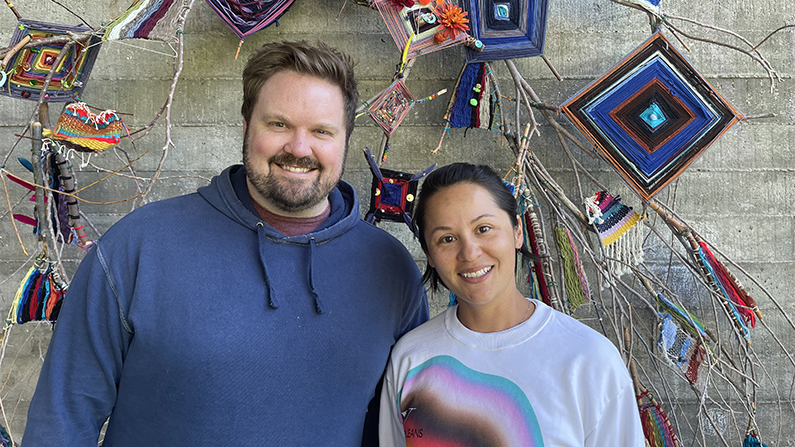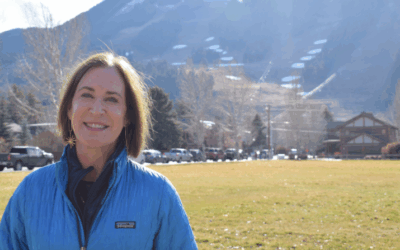KHOL News Director Kyle Mackie spoke to two of the organizers of a new effort called Jackson Hole Pride: Andrew Munz and Karyn Chin. The following interview transcript has been edited for clarity and brevity. Chin is also a board member of KHOL.
KYLE MACKIE: Andrew and Karyn, thank you so much for joining us today on KHOL.
ANDREW MUNZ: Thank you.
KARYN CHIN: Thank you.
MACKIE: We are very excited to have you here today to talk about Jackson’s first month-long Pride celebration. Can you tell us about what this month is going to look like?
MUNZ: Yes, it is a bit of a mosaic in a way. Because what’s been really great about this year, and I think in a way, it almost took like a pandemic to kind of take so much away from us in the idea of gathering and being able to celebrate our own identity, that I think our own individual frustrations and yearnings to kind of do something and do more made us all kind of pop out of the ground like mushrooms. And now it’s been kind of like a gathering of trying to, like, bring all the mushrooms together and kind of harvest our queerness in the form of this month of Pride events. And that is what we’re doing.
MACKIE: Karyn, anything you want to add there?
CHIN: Yeah, I would agree with everything that Andy just said. It’s just out of this feeling of every time I meet someone who is queer in this community, the reaction that I get is, ‘I thought I was the only one. I thought I was the only person here. I thought there was no queer community here.’ And so, I felt very motivated as someone that has done community organizing in Jackson for a long time that I wanted to make sure that people did know that there were others of us here and that we could create the community that we needed.
MACKIE: Can we talk about, you know, the importance for visibility of the queer community especially in a rural place like Wyoming or, you know, Teton Valley on the other side of the pass? Wyoming is a state where the killing of Matthew Shepard* at the University of Wyoming still looms large, I think. And I just wonder what the significance of this much larger celebration this year is for you.
MUNZ: In Wyoming, we have a kind of drought when it comes to positive queer stories that are represented on a much more commercial or larger scale. When people think about Wyoming and you add, you know, a queer tag to it, you know, we have the Matthew Shepard murder, of course. We have “Brokeback Mountain,” you know, which is a fictional story, but it also ends in death—spoiler alert. And you know, these are really just a very, very miniscule representation of who Wyomingites are in general. I mean, there are queer people across the state and a lot of them are isolated in these kinds of small pockets where people withdraw from the public eye or they remain in the closet for a very long time out of fear. And I can speak to that because I’m one of them.
You know, as someone who grew up in Wyoming—I mean, Matthew Shepard was murdered when I was 11, and that was the exact time that I was starting to figure out who I was and learning that some of these words that people were hurling my way might actually have some truth [to them]. Not only that but you could get murdered for them. And that was a very difficult thing for me to experience as a young boy in—even though, you know, Jackson is seen as this blue dot in a red state, it’s still Wyoming. You know, there’s still this sense of hyper-masculinity that pervades, you know, not just rodeo outside of Jackson, but like ski culture, the action sports scene. And, you know, you have women who are, of course, making names for themselves within these like traditionally white male sports. But, you know, what about queer representation? What about, you know, trans representation? There’s not a lot of that at all. And so, Wyoming itself has a lot of work to do. And it feels extremely hopeful and it feels extremely, you know, optimistic just for the future that we have this collective now that’s starting to come forward, that’s starting to come together. It’s a really, really great improvement over what has happened in the past, because I, too, have felt like I’m the only one here, you know, for a lot of my life.
CHIN: Yeah. I mean, the thing about joy for me is, and queer joy in particular, is that when I came out, and I came out only just a couple of years ago, I realized that if I was going to continue to be able to thrive in this community, that I needed to be able to see queer joy. And Matthew Shepard is just this very heavy legacy that Wyoming has. And so, I felt in this almost selfish way that I needed to create the community that I needed and that needed to be centered on a vision of queer joy and visibility and not on always having to fight for our space, because I think that that’s what it gets reduced to a lot—is that we have to fight to be here. We have to fight to have space. We have to fight to have visibility. And so, I wanted to shift that focus and make it about just joyfulness and happiness and just purely about community.
MACKIE: Well, bringing it back to joy, will you tell us about some of the events coming up this month? What are some of the ways that you’re going to be celebrating?
CHIN: Oh, definitely. So, Friday, June 18, is the first queer kickball game. So, we formed a team of queer identifying folks who are going to be playing in the parks and rec kickball league. There’s a Pride event that’ll be happening at The Rose. There will be a Pride event that’s happening over in Victor at High Point Cider.
MUNZ: We have a website for Pride events that is www.jhpride.com. On that page, we have a calendar of events with dates. There is also an opportunity to help support Pride events. We have a GoFundMe that we launched and that will be kind of our shared pool of resources.
MACKIE: Well, thank you both so much for sharing your passion and your organization around LGBTQ visibility and equality here in Jackson and Wyoming, and Happy Pride! Have a great month.
MUNZ: Thank you.
CHIN: Thank you.
*Matthew Shepard was a 21-year-old student at the University of Wyoming who was brutally attacked and left to die outside of Laramie in an anti-gay hate crime on Oct. 7, 1998. He died of his wounds five days later. The play “The Laramie Project” explores the impact that Shepard’s murder had on the town.






